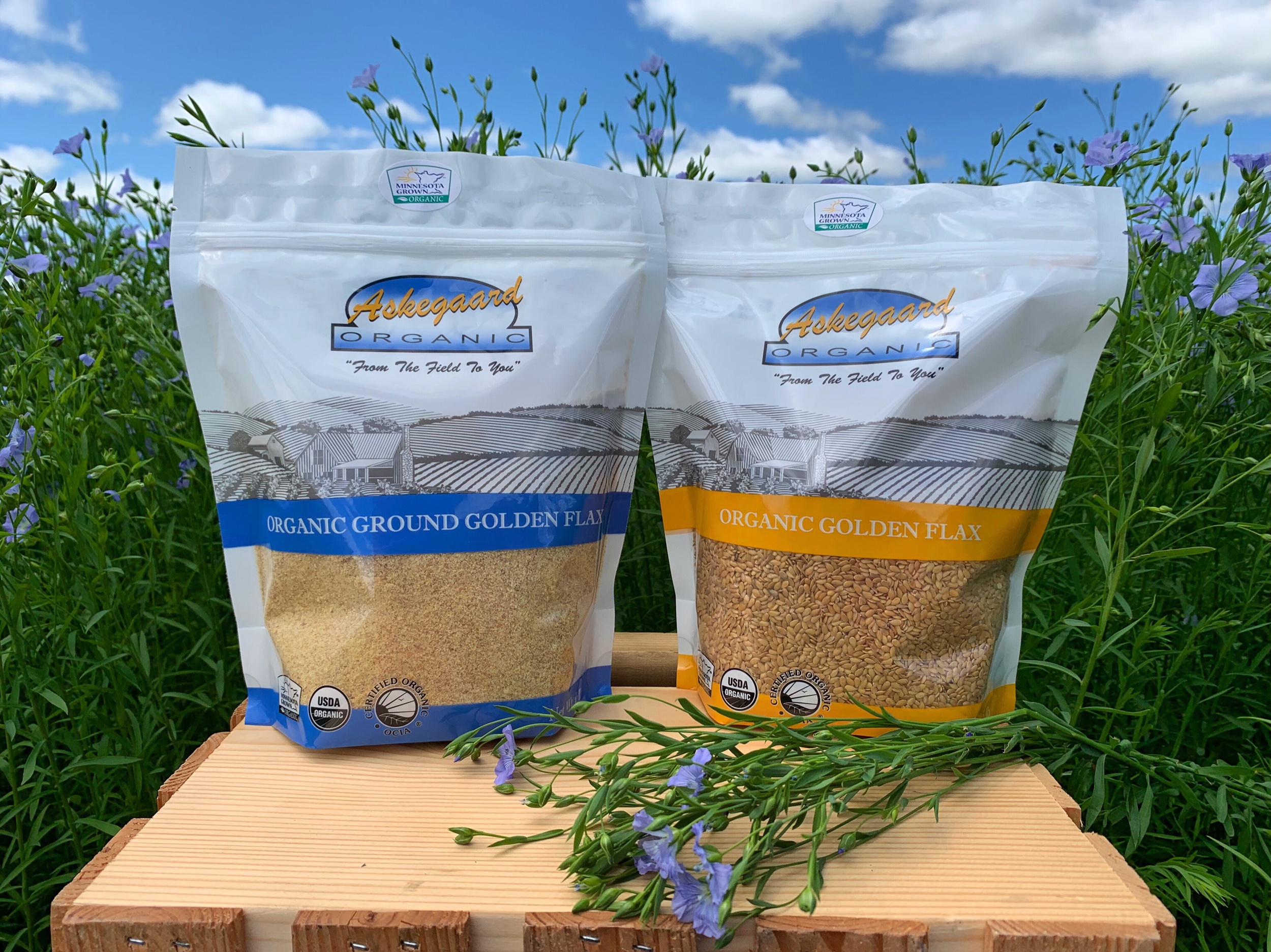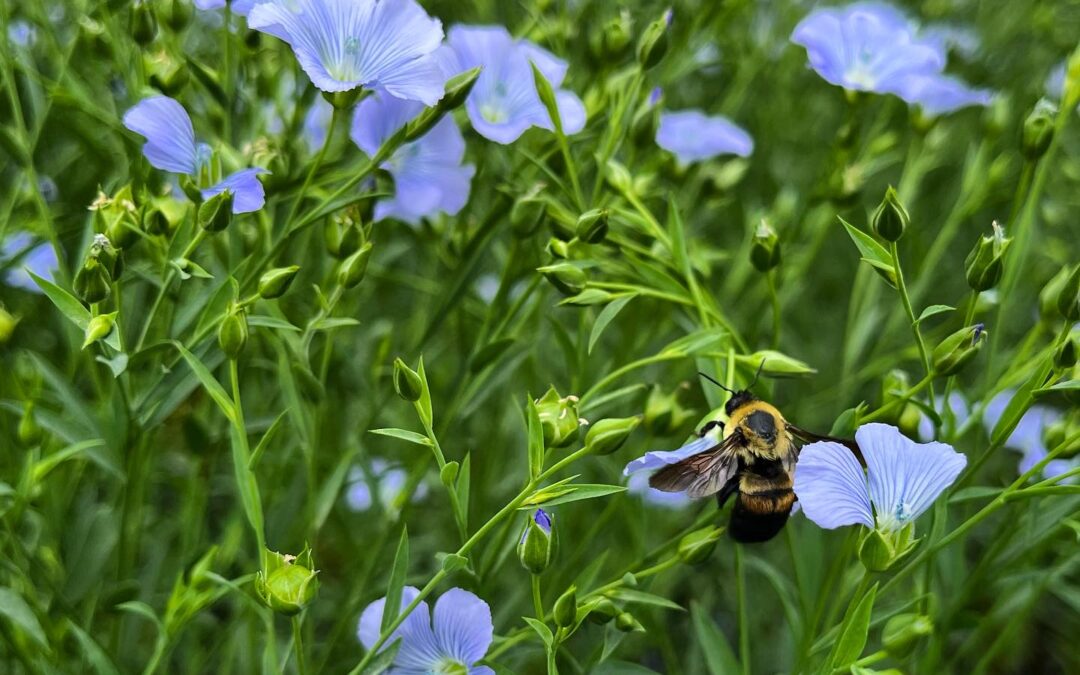For couple Mike and Barb Askegaard of Askegaard Organic Farm, organic farming provided a way to balance health in all aspects of their lives- their family, their customers, and the environment.
“We decided to certify as organic because we saw the negative effects that conventional farming was having on both human health and environmental health,” Mark said. “We didn’t want to expose ourselves or our neighbors to unnecessary chemicals. We want to have clean water, clean air, and healthy soil for all.”
FAMILY FIRST
One key aspect of the Askegaard operation is promoting health within their own family. The sixth-generation family operation in Moorhead, Minnesota, was initially transitioned to organic in 1995 by Mark and Barb to help support their health. This meant they were no longer being exposed to the industrial pesticides, herbicides, and fertilizers conventional operations often utilize.
Thirty years later, Askegaard Organic Farm is now operated by Mark and his daughter Beth McConnon. During busy seasons in the spring and fall, Barb and other family members also pitch in to ensure everything runs smoothly.
QUALITY AT EVERY LEVEL
Askegaard Organic Farm currently produces organic wheat, oats, soybeans, and flax, and utilizes an extensive cover crop plan. The flaxseed is milled and packaged on-farm and then sold to retail and wholesale markets. Askegaard Organic Farm flaxseed is distributed in grocery stores and food cooperatives and used by bakeries, hospitals, and schools across the Midwest.
For this operation, organic certification provides an additional level of quality and trust for their product.
“Organic certification brings a lot of value to our operation; our customers can trust that our crops are grown free of chemicals and are non-GMO, and that we are growing our crops in healthy soil,” Mark said.
With no plans to slow down, the family farm envisions a future where the operation is expanding and continuing to build soil health. Part of this plan involves incorporating perennial cover crops into the crop rotation.

FINDING THE BEST FIT
When Mark and Barb began to transition to organic, one of the first decisions they made was who to certify with. After some research and conversations with neighbors, it became clear that OCIA was the best fit for their operation.
“We decided to certify with OCIA because it was one of the first agencies certifying organic crops when we transitioned,” Mark said. “We were referred to OCIA by a neighbor who was also transitioning to organic at the time.”
As the Askegaard operation has continued to grow and change, OCIA has remained its certifier of choice.
“We have continued to certify through OCIA because we’ve been very satisfied with their application and certification process, their friendly staff, and their good reputation amongst organic certification agencies,” Mark said.

In February 2024, Mark and Beth received OCIA Research and Education’s 2024 Outstanding Farmer of the Year award. This award highlights OCIA-certified farmers’ efforts to build soil health, reduce pests and weeds, enhance the environment, and remain involved in the organic community.
To learn more about Askegaard Organic Farm, visit https://www.askegaardorganicfarm.com/.
-
Are you a farmer, rancher, or processor who has transitioned to organic with OCIA International?
This post is part of a series featuring OCIA International certified organic operators from Canada, Mexico, Nicaragua, Peru, and the United States. Are you an OCIA operator interested in being featured? E-mail us at info@ocia.org for more information.
Every operator’s path to organic is different. Read more from our “Operator Spotlight” series to learn about the different paths to organic certification.
- Bessette Creek Farm: Through traditional organic farming methods like the use of cover crops and crop rotation, Bessette Creek Farm improved the quality of their soil, reduced their water usage, and now better retains moisture in their soil even during the driest months of the year.
- Allan Kettle: In the mid-1990s, Allan Kettle decided to organically certify his Alberta farm. For Allan, the decision to pursue organic certification was easy. Allan’s father, who operated the farm before him, had never used synthetic fertilizers or sprays. Allan continued those practices when he took over the farm.
- Variety Coffee: Variety Coffee has a simple mission: provide customers with the freshest, highest quality coffee possible. The Brooklyn-based coffee roster and chain of cafes does this by sourcing coffee beans from around the world, focusing on acquiring beans that reflect growing seasons of different coffee-producing regions.
- Edelman Certified Organic Farm: Brad Edelman’s passion is sustainable agriculture. The Kansas-based farmer has made it his life’s work to farm sustainably and help others make the transition to sustainable practices.
Learn more about organic agriculture, certification, and OCIA International.
- Should you transition to Organic?: The decision to transition a conventional operation to organic is deeply personal. Organic certification requires resources, like time and money, and perseverance in the face of the challenges that you will inevitably encounter along the way. Is transitioning to organic the right step for your operation?
- Organic Certification Process: All operators seeking initial organic certification must complete a similar six step process regardless of which certification agency they partner with. The certification process can feel intimidating at first, but knowing what to expect can help alleviate much of the stress you might initially feel.
- Organic System Plan: Everyone seeking organic certification–whether applying for the first time or the seventeenth time–must submit an updated Organic System Plan (OSP). But what is an OSP? And more importantly, how will it help you beyond certification?
- Healthy Soil: Cultivating healthy soil requires establishing ecological balance and increasing biological diversity. But how can you establish healthy soil on your farm?
- Why Certify with OCIA?: Choosing an organic certification agency is one of the most important points in an operator’s certification process. Let us tell you why OCIA is the right choice for you.

